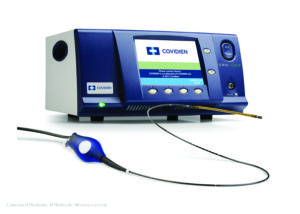The ClosureFast™ radiofrequency ablation system, a clinically proven, minimally invasive treatment, seals problem veins for patients with CVI.
Vein Care Center of Illinois is now using innovative technology for the treatment of chronic venous insufficiency, a disease that impacts 190 million people globally (more than 30 million Americans).
Vein Care Center of Illinois is using minimally invasive treatment technologies, such as the ClosureFast™ system. The ClosureFast™ system utilizes radiofrequency ablation (uniform heat) to seal off the problem vein so blood gets re-routed to another path. The unique procedure is proven effective9 in eliminating varicose veins and improving the appearance of the legs, allowing for a short, comfortable recovery and a quick return to everyday activities. CVI, which can sometimes present as varicose veins, is a serious health issue for Palos Park area residents. In fact, less than 10  percent of people seek treatment for varicose veins. Many people with varicose veins believe their condition to be a cosmetic issue. However, if left untreated, varicose veins can progress to CVI, a serious disease that can cause leg pain, swelling, restlessness, skin damage and ulcers.
percent of people seek treatment for varicose veins. Many people with varicose veins believe their condition to be a cosmetic issue. However, if left untreated, varicose veins can progress to CVI, a serious disease that can cause leg pain, swelling, restlessness, skin damage and ulcers.
“Data published in the British Journal of Surgery found that CVI patients treated with the ClosureFast™ procedure had strong closure rates and minimal treatment side effects at five years.” With CVI and varicose veins, the valves in the leg veins that direct blood from the legs back toward the heart no longer function properly, causing blood to pool in the legs. Although this can occur at any time, increased age is a risk factor. Varicose veins and CVI also tend to be more prevalent in women who have been pregnant, in people who have a family history of CVI or those whose jobs require them to spend a great deal of time standing.
Studies show that the ClosureFast™ procedure is associated with lower rates of pain, bruising and complications, and a faster improvement in patients’ quality of life when compared to 980 nm laser ablation. The procedure is generally conducted in a physician’s office or outpatient setting, and is covered by most health insurance. The average patient typically resumes normal activities within a few days following treatment, and most patients report a noticeable improvement in their symptoms within one to two weeks after the procedure. For more information about treatment for CVI, visit: VeinCC.com.
